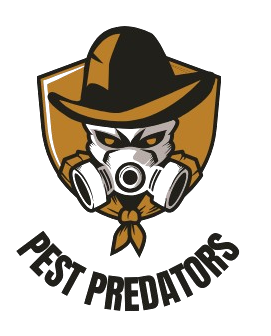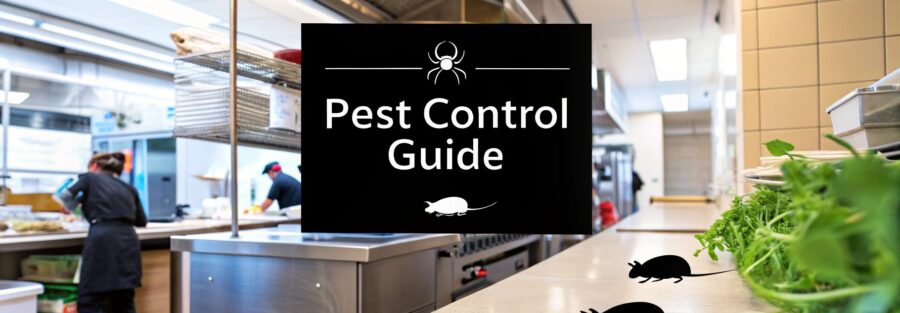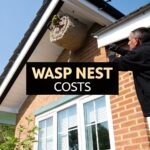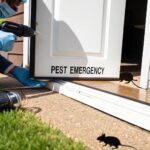Commercial pest control isn't just another business expense; it's a vital investment in the health, safety, and reputation of your company. Think of it as your frontline defence, stopping minor pest issues from snowballing into costly disasters that could shut you down or damage your brand.
Protecting Your Business Is a Non-Negotiable Investment
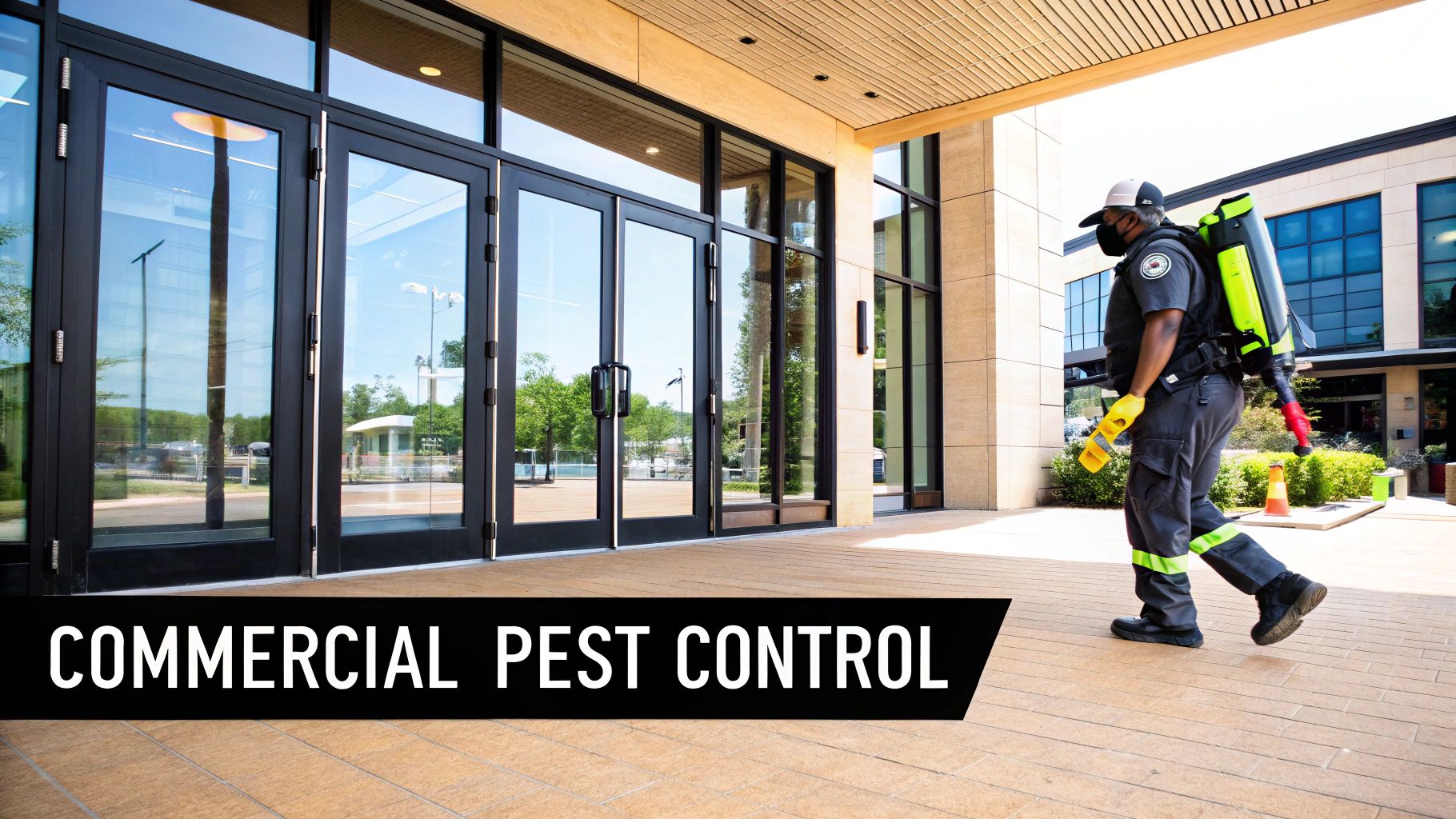
One of the biggest mistakes business owners make is viewing pest control as something you only do after a problem appears. That’s a dangerous game to play. It's much better to think of it like your IT security. You don't wait for a hacker to steal your data before installing firewalls; you set them up to prevent an attack from ever succeeding. Commercial pest control works the same way, creating a protective shield around your business.
A single mouse sighting or a few flies in the wrong place can set off a chain reaction that goes far beyond a simple nuisance. The real-world consequences can be severe, leading to major financial hits and a tarnished reputation.
The True Cost of an Infestation
Ignoring the early signs of pests can lead to some truly catastrophic outcomes that hit your bottom line hard. The risks come from all angles and can cripple even a thriving business if they aren't dealt with swiftly.
Just consider what could happen:
- Damaged Inventory: Rodents are notorious for chewing through packaging and ruining entire batches of products. In a warehouse or kitchen, stored product insects can contaminate huge quantities of raw ingredients, rendering them useless.
- Operational Shutdowns: All it takes is a health inspector finding an infestation to force an immediate closure. That means zero revenue and paying staff while your doors are shut.
- Legal Liabilities: Failing to keep your premises pest-free can put you in breach of health and safety regulations. The result? Heavy fines and the risk of legal action from customers or employees who have been affected.
- Irreversible Brand Harm: In our age of instant reviews and social media, a single photo of a pest shared online can undo years of hard work building customer trust.
A Growing Market Reflects a Growing Need
The demand for professional pest management isn't just something we're seeing on the ground; the numbers back it up. The UK insect pest control market was recently valued at over £800 million and is expected to grow by around 6.6% each year through 2035. This growth is being fuelled by tougher hygiene standards and compliance pressures, particularly in cities where pest problems are more intense. You can learn more about the strategic importance of fly control in the UK commercial sector on lodi-uk.com.
The modern gold standard for protection is Integrated Pest Management (IPM). It's a smart, sustainable strategy that focuses on understanding why pests are there in the first place. IPM works by creating an environment where they simply can't survive, using targeted treatments only as a last resort.
This is a much more forward-thinking approach than simply spraying chemicals. It’s about building a resilient, long-term defence that protects your property, keeps you compliant, and safeguards your brand’s reputation for the long haul.
Identifying Common Pests in UK Businesses
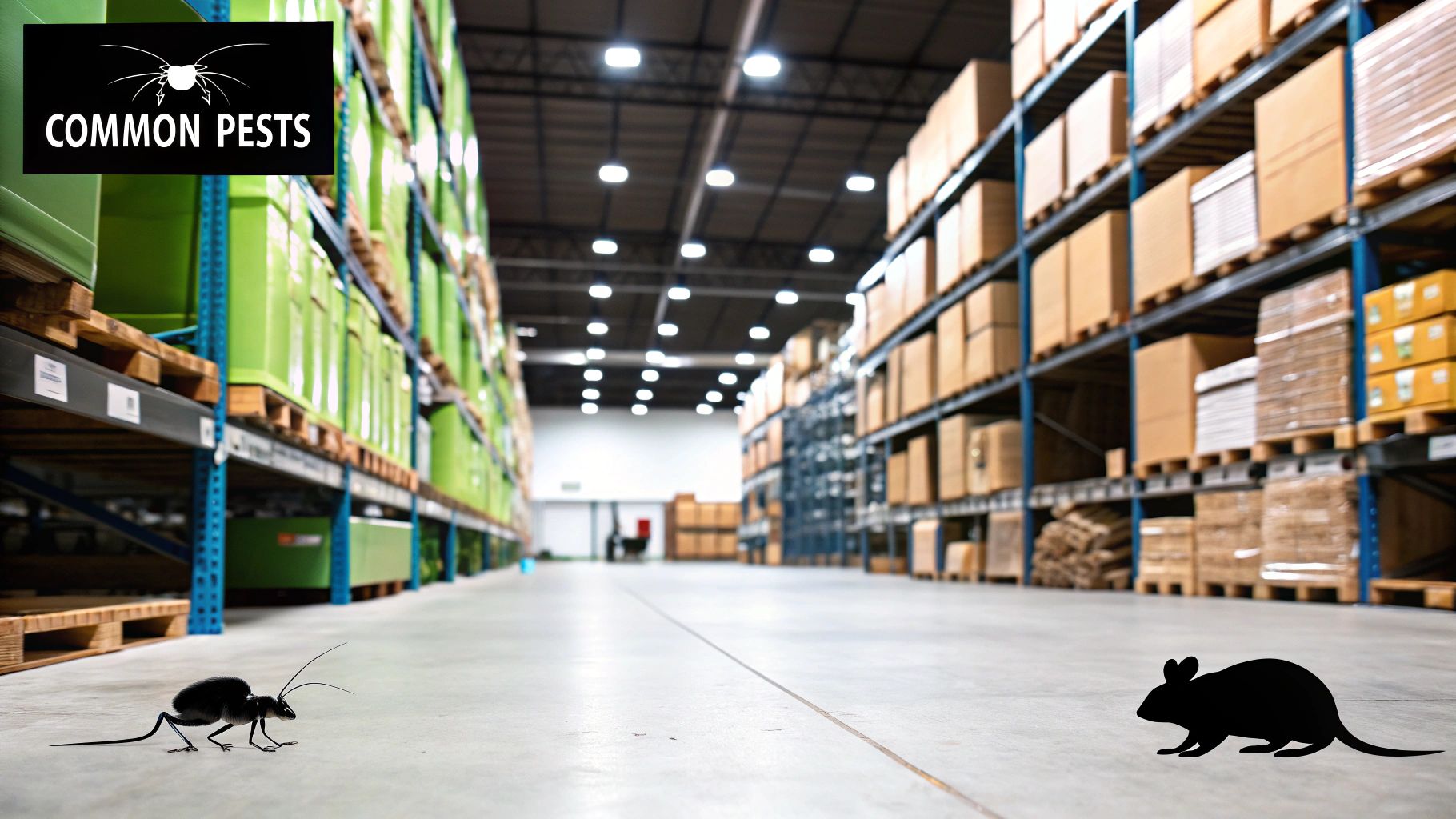
Knowing your enemy is the first step to winning the battle against pests. For a business owner, this isn't about becoming an expert in biology; it’s about understanding your specific weak spots. Each industry creates a unique environment, and unfortunately, that environment can be a magnet for certain pests.
Think of it as a field guide for your business. The challenges a warehouse manager faces are completely different from those of a hotelier or a healthcare director. Spotting the early signs is everything. It means you can act before a small problem spirals into a full-blown crisis that costs you stock, customers, and your hard-earned reputation.
Rodents: The Unseen Wrecking Crew in Storage and Production
Rats and mice are so much more than an unpleasant surprise. They are genuine agents of destruction, especially in places like warehouses, food processing plants, and manufacturing sites. Their teeth never stop growing, which means they never stop gnawing. This habit can lead to serious structural damage and even create fire hazards when they chew through electrical cables.
For any business that holds stock, rodents are a direct hit to the bottom line.
- Contaminated Stock: A single rat or mouse can contaminate huge amounts of inventory with droppings and urine, making it totally unsaleable.
- Damaged Packaging: They will chew through cardboard, plastic, and just about anything else to get to a food source, causing immediate financial loss.
- Reputational Damage: Nothing destroys trust faster than a customer or an auditor finding evidence of rodents. Gnaw marks or droppings can lead to failed inspections and lost contracts.
The trick is to catch them early. Keep an eye out for tell-tale signs like small, dark droppings, gnaw marks on fixtures or products, and greasy smear marks along walls where they run. These are red flags that you need professional commercial pest control services straight away.
The UK's pest control market is on the rise, with revenues predicted to hit nearly US$ 608 million by 2027. This growth is fuelled by things like our changing weather patterns and urban waste challenges, which are creating perfect breeding grounds for pests. It's interesting to note that insects are the biggest troublemakers, making up almost 40% of the market. You can dig into more data on the UK pest control market to see the full picture.
Insects: A Major Threat to Hygiene and Health
Insects are a varied and relentless threat, with the power to shut down businesses where cleanliness is non-negotiable. From cafés and hospitals to shops and hotels, different creepy-crawlies bring their own unique risks.
Cockroaches, for instance, love the warm, damp spots found in commercial kitchens, laundries, and boiler rooms. They're notorious carriers of nasty pathogens like Salmonella and E. coli, creating a serious health hazard for your staff and customers. Just one sighting can trigger a health code violation and force you to close your doors.
Flying Pests and Stored Product Pests
Flying insects like flies and wasps are another huge headache, especially for businesses with outdoor seating or constantly opening doors. Flies are well-known for spreading disease by landing on food and surfaces, while wasps can create a genuinely scary and dangerous atmosphere for customers and staff.
Then there are the silent destroyers: Stored Product Insects (SPIs), like beetles and moths. They are a major threat to any business that handles dried goods.
- Weevils: Often turn up in flour, rice, and grains, where they can infest and ruin entire shipments.
- Moths: Their larvae contaminate products like cereals and nuts with their webbing and waste.
- Beetles: Pests like the biscuit beetle can burrow deep into packaged goods, destroying your stock from the inside.
To help you get a clearer picture, we've put together a quick guide to the most common culprits found in UK businesses.
Common UK Commercial Pests and Their Primary Risks
| Pest Type | Common Species in the UK | Primary Risks to Business | Typical Industries Affected |
|---|---|---|---|
| Rodents | Brown Rat, House Mouse | Contamination of stock, property damage, fire risk, reputational harm. | Warehousing, Food Processing, Hospitality |
| Cockroaches | German, Oriental | Disease transmission (Salmonella, E. coli), allergic reactions, health code violations. | Restaurants, Healthcare, Hotels |
| Flying Insects | House Fly, Bluebottle, Wasp | Contamination of food/surfaces, customer nuisance, painful stings. | Food Service, Retail, Pubs & Bars |
| Stored Product Insects | Weevils, Moths, Biscuit Beetles | Infestation of stored goods, product loss, supply chain disruption. | Bakeries, Food Manufacturing, Supermarkets |
| Birds | Pigeons, Gulls | Property damage from droppings, spreading disease, creating hazards. | Retail Parks, Warehouses, Historic Buildings |
| Bed Bugs | Common Bed Bug | Bites on guests/customers, severe reputational damage, costly treatments. | Hotels, Hostels, Transport |
Catching these pests before they take hold comes down to being vigilant. You need to be regularly inspecting your stock, sticking to strict cleaning schedules, and understanding the specific threats your industry faces. It's the only way to protect your business from these invasive and expensive problems.
The Smarter Approach of Integrated Pest Management
The days of simply spraying chemicals and hoping for the best are long gone in commercial pest control services. The industry has moved on. Today, the gold standard is a far more intelligent strategy called Integrated Pest Management (IPM). It isn't just a service; it's a completely different way of thinking, designed to deliver lasting results by getting to the root cause of any pest problem.
Think of it like a wellness plan for your business premises. Instead of waiting for a problem to appear and then reacting with strong treatments, IPM focuses on creating an environment where pests simply can't thrive in the first place. It’s all about prevention, just like a healthy lifestyle keeps illness at bay.
The core idea is to make your building fundamentally unwelcoming to pests. This is done through a continuous cycle of prevention, monitoring, and targeted, minimal intervention. Chemical treatments aren't the first line of defence; they are a last resort, used with surgical precision only when absolutely necessary.
The Core Components of an IPM Programme
A successful IPM strategy is built on three interconnected pillars. Each step feeds into the next, creating a smart, data-driven cycle that keeps your business protected all year round. It’s a proactive model, and it’s miles more effective than just reacting after an infestation has already caused damage.
This is an organised, methodical process that leaves nothing to chance.
- Thorough Inspection: It all starts with a detailed assessment of your property. A trained technician will hunt for potential entry points, hidden food and water sources, and any nesting spots that could attract pests. It’s about understanding your building’s unique vulnerabilities.
- Continuous Monitoring: IPM runs on constant vigilance. This means strategically placing monitoring devices—like insect light traps or rodent bait stations—to gather real-time data on pest activity. This information helps us spot new threats early and tells us if our control measures are working.
- Strategic Action: When action is needed, it’s always targeted. It might mean something as simple as sealing a crack in a wall, improving sanitation practices, or deploying a non-toxic trap. If a chemical treatment is needed, it will be a specific product applied in a precise location to minimise any risk.
This approach is part of a major industry shift towards smarter, more sustainable solutions. The whole sector is moving towards IPM, focusing on prevention and data over old-school chemical treatments. It’s a balancing act between being effective and being environmentally responsible—something more and more businesses demand to protect their brand and meet sustainability goals.
Why IPM Delivers Superior Long-Term Results
Adopting an IPM strategy isn't just about being green; it's a sound business decision with real, tangible benefits. By focusing on prevention, you solve problems before they can hit your bottom line, damage your reputation, or cause compliance issues. You can find out more in our detailed guide on what is Integrated Pest Management.
This intelligent approach is also fundamentally more cost-effective over time. It might require a small upfront investment in assessment and proofing, but it prevents the far bigger costs that come with a full-blown infestation—things like lost stock, operational shutdowns, and emergency call-out fees.
The infographic below shows how inspection frequency can be tailored to different risk levels within a commercial property, which is a key part of any IPM monitoring strategy.
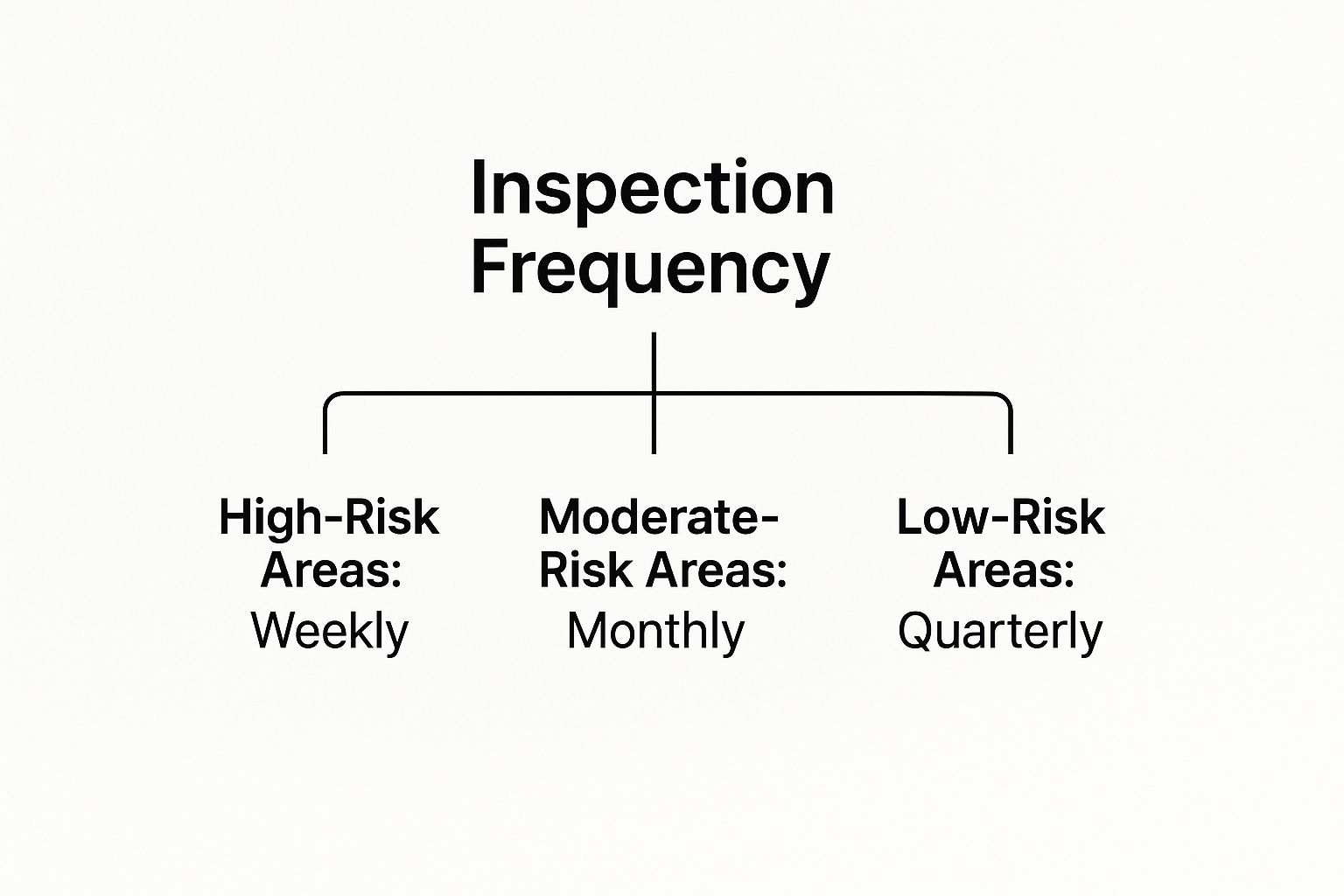
As you can see, an IPM plan directs resources where they’re needed most. It focuses intensive monitoring on high-risk areas while keeping a protective watch over the entire facility, ensuring maximum protection without wasting money.
Key Takeaway: Integrated Pest Management is a partnership. It transforms pest control from a reactive expense into a proactive investment that safeguards your assets, creates a safer environment for staff and customers, and protects your brand’s integrity.
Navigating UK Pest Control Regulations
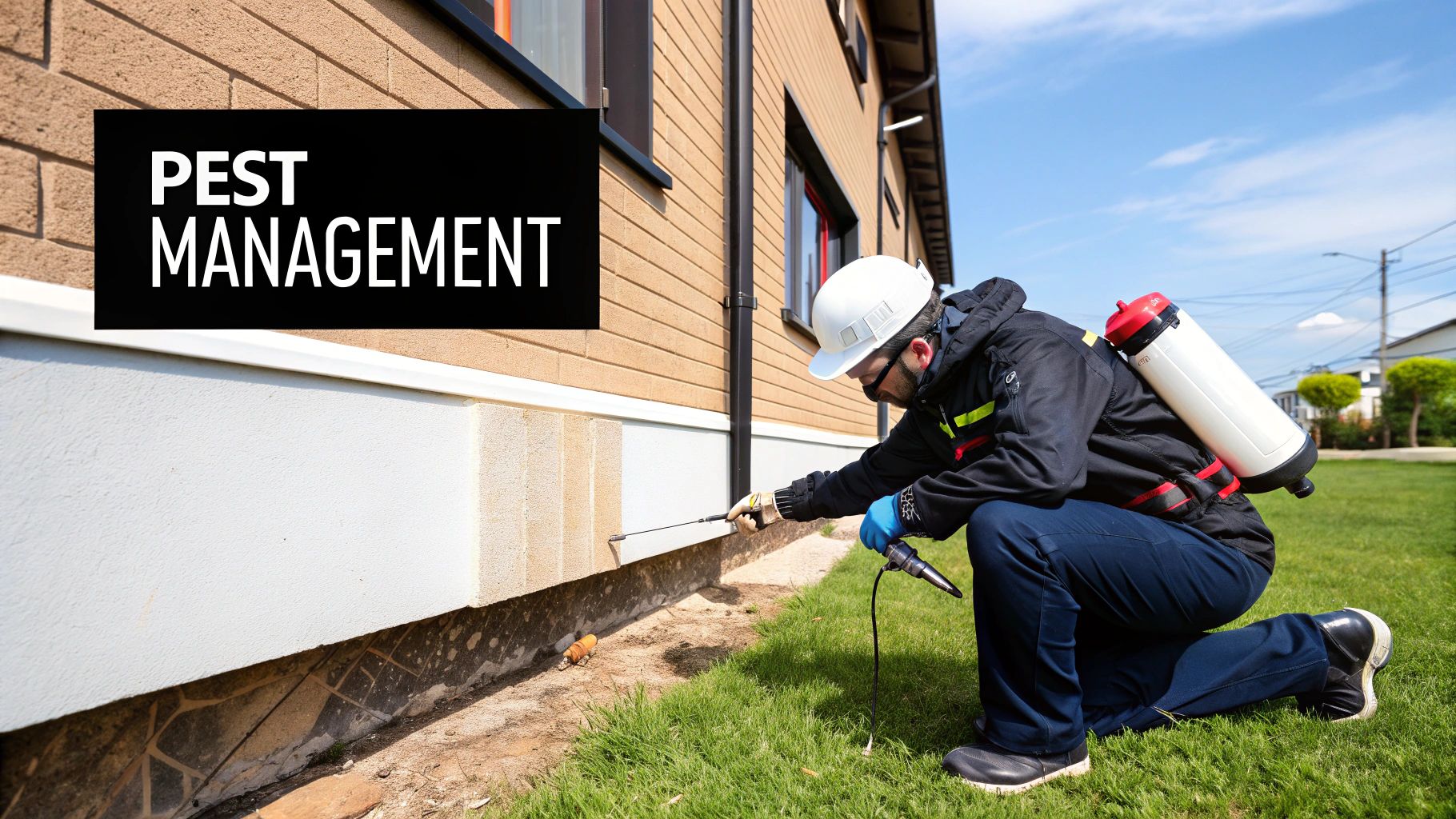
When you're running a business, compliance isn't just a box-ticking exercise. It's the very foundation of your operation’s legitimacy and, frankly, its survival. Getting UK pest control regulations wrong can lead to a world of pain, from hefty fines right through to forced closures. That’s why professional pest management isn't just a "nice to have"—it's an essential part of your legal and operational framework.
The first step is simply understanding what the law expects from you. You don't need to become a legal scholar, but you do need to recognise your responsibilities and put the right safeguards in place. These rules are there to protect public health, and you can be sure that inspectors take them very seriously.
Key Legislation for UK Businesses
A few key pieces of legislation form the backbone of pest control requirements here in the UK. They might sound a bit complex, but their core message is straightforward: you must do everything reasonably possible to stop pests from contaminating your premises and creating a health risk.
Two of the big ones you absolutely need to know are:
- The Food Safety Act 1990: This is the cornerstone for any business that handles, prepares, or sells food. It clearly states you must have adequate procedures in place to control pests. Failing to do so can have disastrous consequences.
- The Health and Safety at Work Act 1974: This is a much broader act, but it's just as relevant. It requires you to ensure the welfare of your employees and anyone else affected by your business. A pest infestation introduces all sorts of hazards, from disease to property damage, putting it squarely within this act’s scope.
The Power of Due Diligence
If there's one concept to grasp, it's 'due diligence'. This is your most important legal defence. In simple terms, it means proving you’ve taken every reasonable step to prevent a problem from happening in the first place. And nothing proves it better than a professionally managed and documented pest control plan.
This paperwork is your legal shield. It’s not enough to simply be pest-free; you must be able to prove you have a proactive system in place to keep it that way. Regular service reports, risk assessments, and action logs from your pest control provider become invaluable during an audit.
The spotlight on this area has only grown brighter with rising public health concerns. For instance, the increase in vector-borne illnesses like Lyme disease, which made up around 17% of infectious diseases in the UK circa 2019, has underscored the need for professional insect control in all commercial settings. You can find more information about pest control market trends in the UK and what they mean for public health.
Meeting Industry-Specific Audit Standards
For businesses in high-stakes sectors like food production or healthcare, general compliance is just the starting line. Many industries have their own incredibly strict audit standards that demand an even higher level of pest management.
A perfect example is the British Retail Consortium (BRC) Global Standard for Food Safety, a non-negotiable requirement for anyone supplying food products to UK retailers. These audits are famously detailed and place a huge emphasis on proactive pest prevention. Likewise, healthcare facilities and hospitality venues have to follow strict hygiene codes where a zero-tolerance approach to pests is the only option.
Meeting these rigorous standards is practically impossible without partnering with professional commercial pest control services. To see what's involved, you can learn more about our dedicated pest control services tailored for businesses like yours.
How to Choose the Right Pest Control Provider
Picking a commercial pest control company is a serious business decision. Think of it like hiring a key member of your team. The right partner isn't just there to spray for bugs; they're an essential part of your operational defence, safeguarding your reputation and keeping you on the right side of regulations.
It’s tempting to just go for the cheapest quote, but that’s almost always a false economy. Cheaper services often lead to recurring infestations, frustrated staff, and much greater costs down the line. A true pest management partner offers peace of mind. To find them, you need to look past the price tag and dig into their credentials, methods, and real-world experience.
Verify Credentials and Insurance
First things first: check their professional standing. In the UK, membership in a recognised trade body is a massive green flag. It tells you the company is held to high standards and committed to ongoing training.
Look for accreditation from these key bodies:
- British Pest Control Association (BPCA): This is the UK's leading trade association. Members have to pass strict audits to get in and stay in.
- National Pest Technicians Association (NPTA): Another highly respected body that champions high standards and continuous professional development for its members.
Beyond that, proper insurance is non-negotiable. Always ask for proof of Public Liability Insurance. This isn't just a bit of paper; it’s the safety net that protects your business from any accidental damage during treatments.
Prioritise a Commitment to IPM Principles
When you talk to a potential provider, pay close attention to their approach. If they immediately suggest spraying chemicals without even looking around, that’s a major red flag. A modern, professional company will always lead with Integrated Pest Management (IPM), which puts prevention and monitoring first.
A truly professional pest control service is about proactive problem-solving, not just reactive chemical application. Their goal should be to understand why you have a pest issue and implement structural and procedural changes to prevent it from happening again.
This approach shows a much deeper understanding of pest behaviour. It’s a clear sign you’re dealing with experts who want to solve your problem for good, not just lock you into a recurring spray service.
Ask the Right Questions
Once you’ve got a shortlist, it’s time to ask some direct questions. How they answer will tell you everything you need to know about their expertise, reliability, and whether they're the right fit for your specific industry. A quality provider will welcome this—they’ll be proud to explain what they do.
Here’s a quick checklist of what to ask:
- Industry-Specific Experience: "Do you have experience with businesses like mine (e.g., restaurants, warehouses, healthcare)? Can you show me any case studies or references?"
- Technician Qualifications: "What qualifications do your technicians hold? Are they certified to at least RSPH Level 2 in Pest Management?"
- Emergency Response: "What’s your protocol for an emergency? If I call you out, what’s your guaranteed response time?"
- Documentation and Reporting: "What kind of report will I get after each visit? Is it digital and good enough for an auditor?"
- IPM Strategy: "Can you walk me through how you’d build an Integrated Pest Management plan for my premises?"
A solid way to compare your options is to lay them out side-by-side. Use a simple checklist to see how each provider stacks up against the criteria that matter most to your business.
Provider Vetting Checklist Key Comparison Points
| Evaluation Criterion | Provider A | Provider B | Importance (High/Med/Low) |
|---|---|---|---|
| BPCA/NPTA Membership | High | ||
| Public Liability Insurance Verified | High | ||
| Experience in Your Specific Industry | High | ||
| RSPH Level 2 Certified Technicians | High | ||
| Detailed IPM Approach | High | ||
| Digital Reporting System | Medium | ||
| Guaranteed Emergency Response Time | Medium | ||
| Clear Pricing Structure | Medium | ||
| Positive Online Reviews/References | Low |
This table helps you move beyond a simple price comparison and focus on value, expertise, and long-term protection.
Their answers will give you a clear picture of their professionalism and skill. For a better idea of what a comprehensive service looks like, learn more about our approach to pest control for businesses and how we create bespoke protection plans. Choosing the right partner isn't an expense; it's an investment in your business's future.
The Future of Commercial Pest Management
The world of commercial pest control services is changing fast. We’re moving away from the old model of reacting to problems and stepping into a new era of proactive, technology-driven pest science. Think of it less like calling an ambulance and more like installing a sophisticated security system for your business. The future isn’t about waiting for an infestation; it’s about using smart tools to predict and stop pests before they ever get a foothold.
This shift is a genuine game-changer for businesses that want to stay ahead of the curve. It’s no longer just about getting rid of pests. It's about building an intelligent, self-monitoring defence system that protects your property around the clock, with minimal disruption and a much lighter environmental footprint.
Technology Leading the Charge
One of the biggest leaps forward is remote monitoring technology. Imagine tiny, discreet sensors placed in critical areas of your facility—your storerooms, kitchens, or production lines—providing constant surveillance. These clever devices can detect the very first signs of rodent or insect activity and instantly ping an alert to your pest management professional.
This allows for surgical-strike precision. Instead of broad, scheduled sprays, technicians can respond to specific threats as they happen. It means neutralising a potential issue before a single mouse or cockroach has the chance to settle in and start a family.
This data-driven approach is also paving the way for predictive analytics. By analysing data from sensors alongside environmental factors like weather patterns and seasonal trends, we’re getting better and better at forecasting potential pest outbreaks.
This predictive power turns pest management from a purely defensive action into a strategic advantage. It allows businesses to bolster their defences before an expected pest surge hits, which saves a huge amount of time, money, and stress down the line.
A Greener, More Sustainable Standard
Hand-in-hand with all this new tech is a powerful move towards sustainability. The future of pest control is green, with a growing focus on non-toxic and eco-friendly solutions that are every bit as effective as traditional chemical treatments.
These methods put the health of your staff, customers, and the local environment first.
- Biological Controls: Using natural predators to manage pest populations, which is perfect for certain environments.
- Advanced Baits and Gels: Smart formulations that are highly targeted to specific pests, which minimises any impact on other wildlife.
- Heat Treatments: A completely chemical-free method that’s incredibly effective against tough pests like bed bugs and stored product insects.
This focus on smarter, safer methods reflects a wider European trend. As our towns and cities grow—with around 75% of the European population now living in urban areas—the pressure pests put on commercial properties is only going up. This makes innovative, effective control absolutely essential for keeping businesses running smoothly.
You can learn more about pest control market forecasts in Europe and the factors behind this growth. Ultimately, modern pest management is a high-tech field that offers maximum protection with minimal environmental cost—making it the ideal partner for any forward-thinking business.
Frequently Asked Questions
When it comes to commercial pest control services, a few questions always pop up. Business owners naturally want to know the practical side of things, so let's clear up some of the most common queries.
How Often Does My Business Need Pest Control Services?
There’s no magic number here – it really boils down to your specific situation. The right frequency depends on factors like your industry, how old your building is, and even where you’re located.
A restaurant, a food processing facility, or a hospital, for instance, is considered high-risk. These places can't afford a single pest sighting, so they often need monthly or even more frequent visits to stay on top of strict health and safety standards. On the other hand, a low-risk office space might only need a quarterly service to keep things in check. A good pest control professional will always start with a proper look around your site to recommend a schedule that makes sense for you.
The key takeaway is that professional pest management isn't a one-size-fits-all solution. Your service plan should be as unique as your business, focusing resources where they are needed most to prevent infestations before they can begin.
Are Your Pest Control Treatments Safe for My Staff and Customers?
Absolutely. In modern pest control, the safety of your people—staff, customers, visitors—is the number one priority. The whole philosophy behind Integrated Pest Management (IPM) is to use chemicals as a last resort, focusing first on prevention, good housekeeping, and blocking entry points.
When a treatment is unavoidable, our licensed technicians use products specifically approved for commercial spaces. They apply them with pinpoint accuracy, targeting the pests right where they live to avoid any broad spraying. Before any work starts, your technician will run you through any simple safety precautions, like asking people to stay out of a particular area for a short time. This targeted, safety-first approach is at the heart of professional commercial pest control services.
What Is My Role in the Pest Control Process?
Think of it as a partnership. While our technicians bring the expertise and the tools, your team’s daily habits are what make the professional measures stick. Your involvement is crucial for long-term success.
Here's where you and your team can make a massive difference:
- Maintaining High Standards of Cleanliness: Keeping floors, surfaces, and equipment spotless removes easy food sources for pests.
- Managing Waste Disposal: Proper bin management is a huge deterrent for rodents and insects looking for a free meal.
- Addressing Structural Issues: When your technician points out a leaky pipe or a gap under a door, getting it fixed helps to physically block pests from getting in.
When we work together and your staff know what to look out for, you create an environment where pests simply don't want to be.
Ready to protect your business with an expert, evidence-based approach? Contact Pest Predators Limited today for a comprehensive assessment and a customised pest management plan that safeguards your property and reputation. Learn more on our website.
